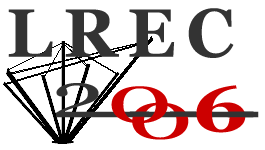Topics
The following non-exhaustive list gives some examples of topics which may be addressed by papers submitted to the Conference:
Issues in the design, construction and use of Language Resources (LRs)
- Methodologies and tools:
- Guidelines, standards, specifications, models and best practices for LRs.
- Methods, tools, procedures for the acquisition, creation, annotation, management, access, distribution, use of monolingual and multilingual LRs.
- Methods for the extraction and acquisition of knowledge (e.g. terms, ontologies, lexical information, language modelling) from LRs, and knowledge transfer among languages.
- Definition and requirements for a Basic and Extended LAnguage Resource Kit (BLARK, ELARK) for all languages.
- Documentation and archiving of languages, including minority and endangered languages.
- LRs for linguistic research in human-machine communication.
- LRs construction & annotation:
- Metadata descriptions of LRs and metadata for semantic/content markup.
- Ontologies and knowledge representation, especially with respect to HLT.
- Terminology and NLP tools and methodologies for terminology and ontology building or mapping, term extraction, domain-specific dictionaries.
- LRs for machine translation.
- LRs for ubiquitous processing.
- Availability and use of generic vs. task/domain specific LRs.
- Multimedia and Multimodal LRs - Integration of various media and modalities in LRs (speech, vision, language).
- LRs exploitation:
- Industrial production of LRs.
- Industrial LRs requirements, user needs and community’s response.
- Exploitation of LRs in different types of applications (information extraction, information retrieval, speech dictation, translation, summarisation, web services, semantic web, semantic search, text mining, inferencing, etc.).
- Exploitation of LRs in different types of interfaces (dialogue systems, natural language and multimodal/multisensorial interactions, etc.).
- Issues in Human Language Technologies (HLT) evaluation
- Methodologies, tools and standardisation:
- Evaluation, validation, quality assurance of LRs.
- Evaluation methodologies, protocols and measures.
- Benchmarking of systems and products, resources for benchmarking and evaluation, blackbox, glassbox and diagnostic evaluation of systems.
- From evaluation to standardisation.
- User centered design tools and methods.
- Evaluation of ontologies and knowledge bases by means of LR-related techniques.
- Evaluation in written language processing: (document production and management, text retrieval, terminology extraction, message understanding, text alignment, machine translation, morphosyntactic tagging, parsing, semantic tagging, word sense disambiguation, text understanding, summarization, question answering, localization, etc.).
- Evaluation in spoken language processing: (speech recognition and understanding, voice dictation, oral dialogue, speech synthesis, speech coding, speaker and language recognition,spoken translation, etc.).
- Evaluation of multimedia document retrieval and search systems (including detection, indexing, filtering, alert, question answering, etc.).
- Evaluation of multimodal systems.
- Usability evaluation of HLT based user interfaces:
- Usability and user satisfaction evaluation.
- Psychophysical and cognitive evaluation.
- User experience assessment.
- Heuristic evaluation.
- Multimodal interaction evaluation.
- Evaluation of usability in mobile services/applications, etc.
General issues
- National and international activities and projects.
- Open architectures for LRs.
- LRs and the needs/opportunities of the emerging industries.
- LRs and contributions to societal needs (e.g. e-society).
- Priorities, perspectives, strategies in national and international policies for LRs.
- Needs, possibilities, forms, initiatives of/for international cooperation, and their organisational and technological implications.
- Organisational, economical and legal issues in the construction, distribution, access and use of LRs.
Copyright © 2006 ELRA
